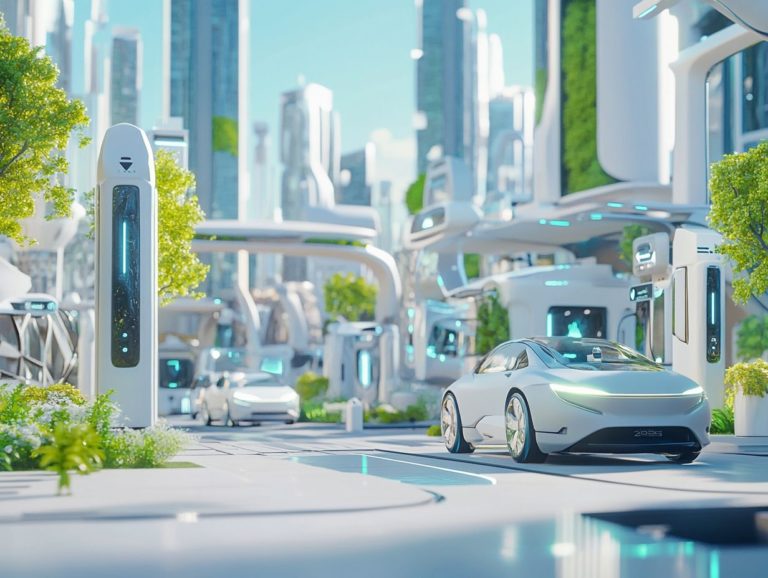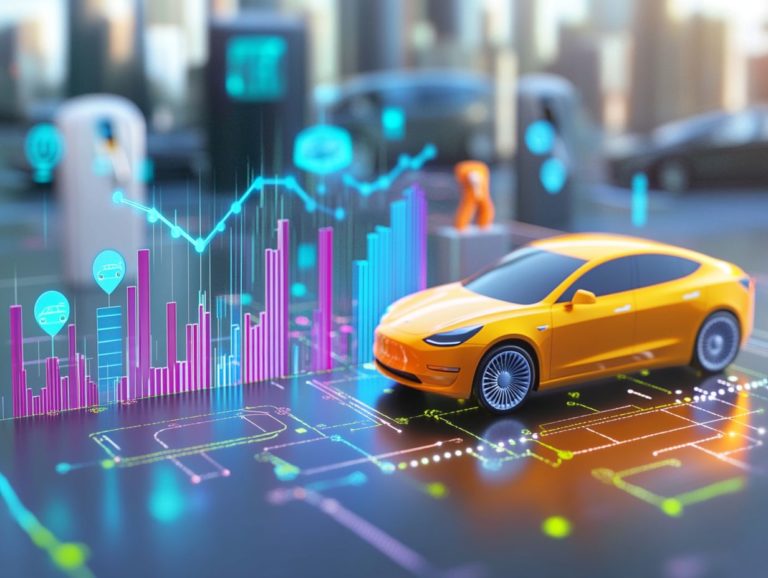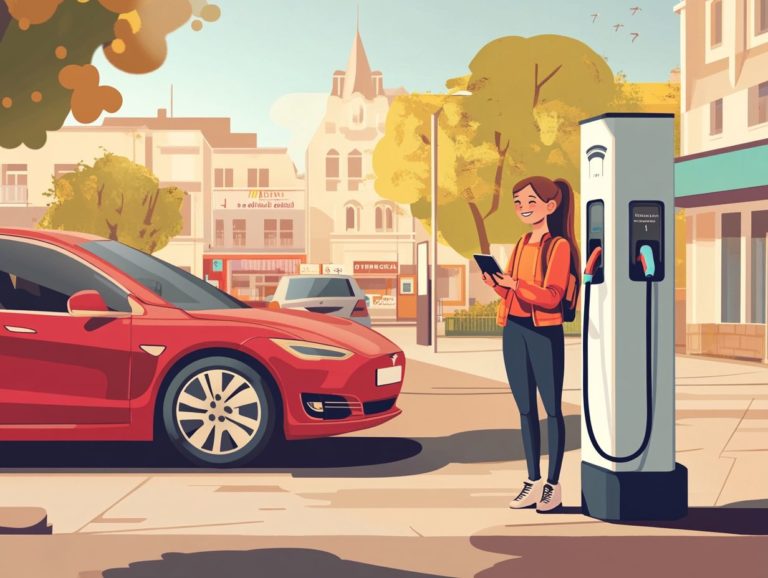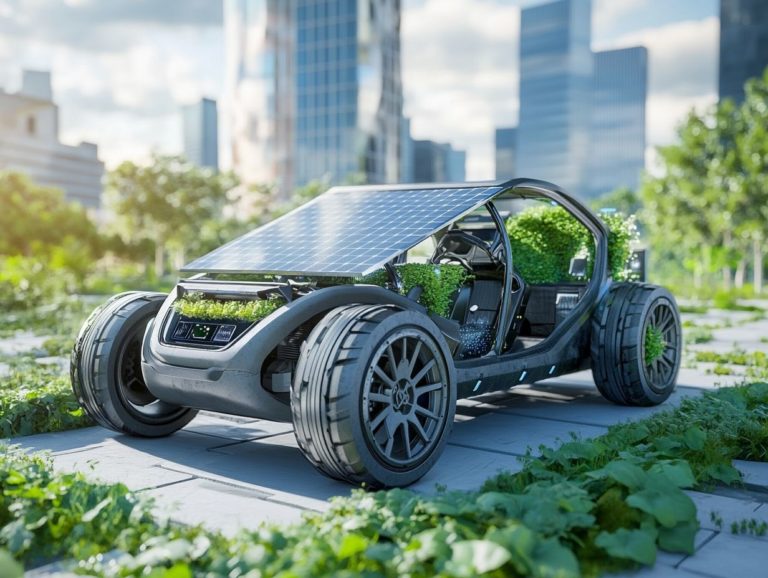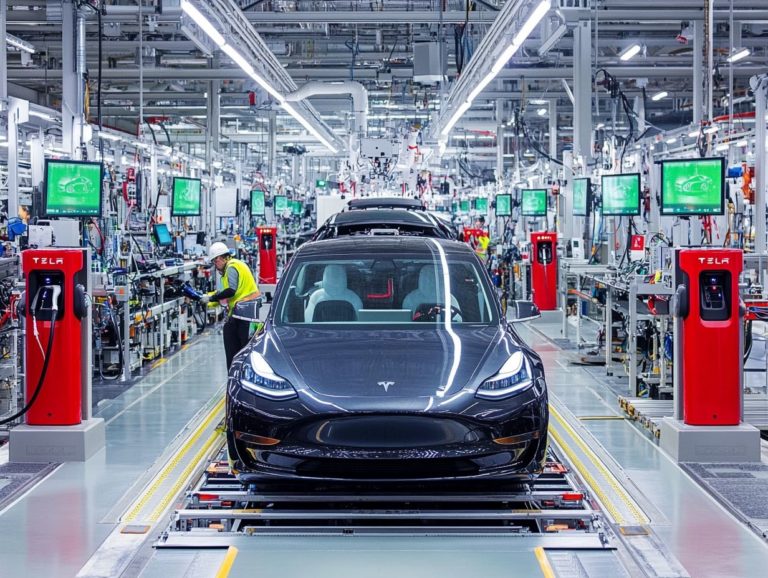the latest trends in electric vehicle technology
Electric vehicles (EVs) are revolutionizing the automotive landscape, providing you with eco-friendly alternatives to traditional gas-powered cars.
As technology continues to evolve, various types of EVs such as Battery Electric Vehicles (BEVs) and Plug-in Hybrid Electric Vehicles (PHEVs) are becoming increasingly popular.
This article delves into the latest trends that are shaping the future of electric vehicles, from cutting-edge battery innovations to enhanced charging infrastructure.
Explore how these advancements are effectively reducing carbon emissions and helping to diminish our reliance on fossil fuels.
Join us and imagine the future of mobility and its significant impact on our environment.
Contents
- Key Takeaways:
- Types of Electric Vehicles
- The Latest Trends in Electric Vehicle Technology
- Impact of Electric Vehicles on the Environment
- The Promising Future of Electric Vehicles: What to Expect
- Frequently Asked Questions
- What are some of the latest trends in electric vehicle technology?
- How are electric vehicles evolving in terms of battery technology?
- What role does artificial intelligence play in electric vehicle technology?
- How are electric vehicles utilizing renewable energy sources?
- What are some of the benefits of the latest electric vehicle technology?
- Are there any challenges facing the adoption of electric vehicle technology?
Key Takeaways:
Battery technology improvements mean longer ranges and better performance for EVs. AI features in EVs make driving easier and safer.
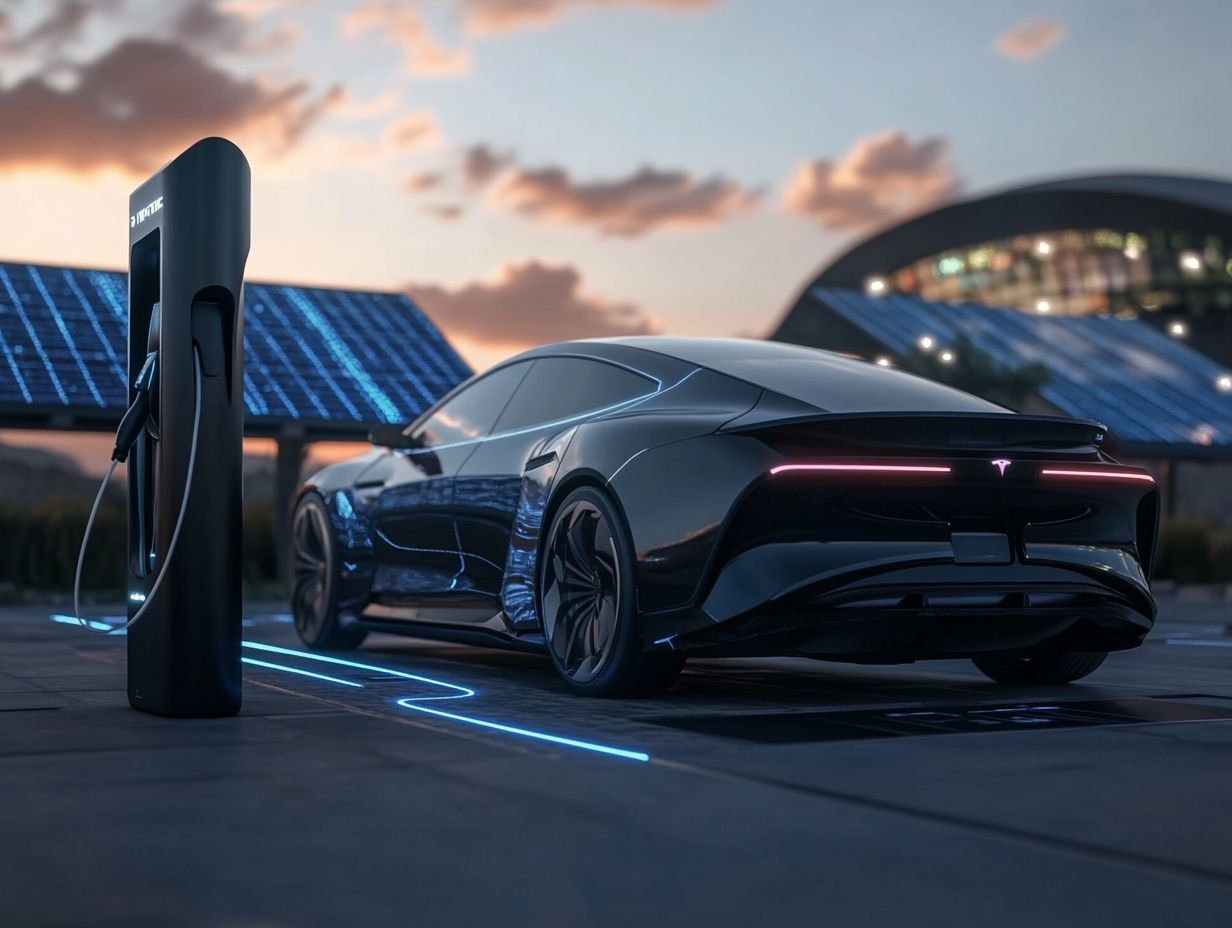
The increasing adoption of electric vehicles is expected to positively impact the environment by reducing carbon emissions and decreasing dependence on fossil fuels, paving the way for a greener future.
What are Electric Vehicles?
Electric vehicles (EVs) represent a big change in the automotive landscape, seamlessly merging new computer chips and advanced battery systems to offer clean, efficient, and sustainable mobility solutions.
You ll find that these vehicles primarily consist of Battery Electric Vehicles (BEVs) and Plug-in Hybrid Electric Vehicles (PHEVs), both crafted to minimize emissions and enhance vehicle performance.
As global electric vehicle sales surge, driven by your desires as a consumer and supportive government help, the transportation sector is undergoing a remarkable shift toward electrification.
Unlike traditional vehicles that depend on internal combustion engines, EVs are powered by electric energy from batteries, allowing you to enjoy lower operational costs and reduced maintenance.
The perks of electric mobility extend beyond just being eco-friendly; they also bring enhanced performance features, like instantaneous torque and whisper-quiet operation.
Government help is crucial in propelling this movement forward, fostering investments in EV infrastructure and promoting your adoption of these vehicles through enticing tax credits and rebates.
Together, these factors are steering the automotive market toward a sustainable and innovative future that you can be a part of.
Types of Electric Vehicles
Electric vehicles can be elegantly divided into two primary categories: Battery Electric Vehicles (BEVs) and Plug-in Hybrid Electric Vehicles (PHEVs).
Each type boasts unique features and benefits that cater to a wide array of consumer preferences and needs within the automotive market.
Battery Electric Vehicles (BEVs)
Battery Electric Vehicles (BEVs) are fully electric cars that harness extensive battery systems to power an electric motor, providing you with a zero-emission alternative to traditional gasoline-powered vehicles. This innovative shift significantly contributes to the growth of electric mobility.
These vehicles also reduce greenhouse gas emissions and promise lower operating costs thanks to fewer moving parts compared to their fossil fuel counterparts.
While BEVs offer numerous advantages, such as quieter operation and adherence to strict environmental regulations, there are still challenges to navigate, including limited charging infrastructure and battery disposal concerns.
As global trends lean toward sustainable transportation, you may find yourself increasingly drawn to the long-term benefits of BEVs, especially in urban environments where air quality is becoming a pressing issue.
By choosing to adopt these electric vehicles, you can play a crucial role in combating climate change while reaping the rewards of modern technology.
Start exploring your options today and join the movement toward a healthier planet!
Plug-in Hybrid Electric Vehicles (PHEVs)
Plug-in hybrid electric vehicles (PHEVs) combine traditional internal combustion engines with electric propulsion, giving you the best of both worlds.
This means you can enjoy the advantages of electric vehicle capabilities while having the flexibility of gasoline power at your fingertips.
It’s a compelling choice for those who desire balanced performance and emissions reductions.
With PHEVs, you’ll experience an extended range compared to fully electric vehicles, effectively alleviating range anxiety that often plagues potential EV buyers.
These vehicles can effortlessly switch between electric and gasoline power, making them an ideal solution for longer journeys.
You ll also find that they can significantly cut down emissions, particularly in urban environments where electric driving excels.
PHEVs are a perfect solution for eco-conscious drivers, offering impressive fuel efficiency and a lower environmental impact without the limitations that can accompany all-electric vehicles.
The Latest Trends in Electric Vehicle Technology
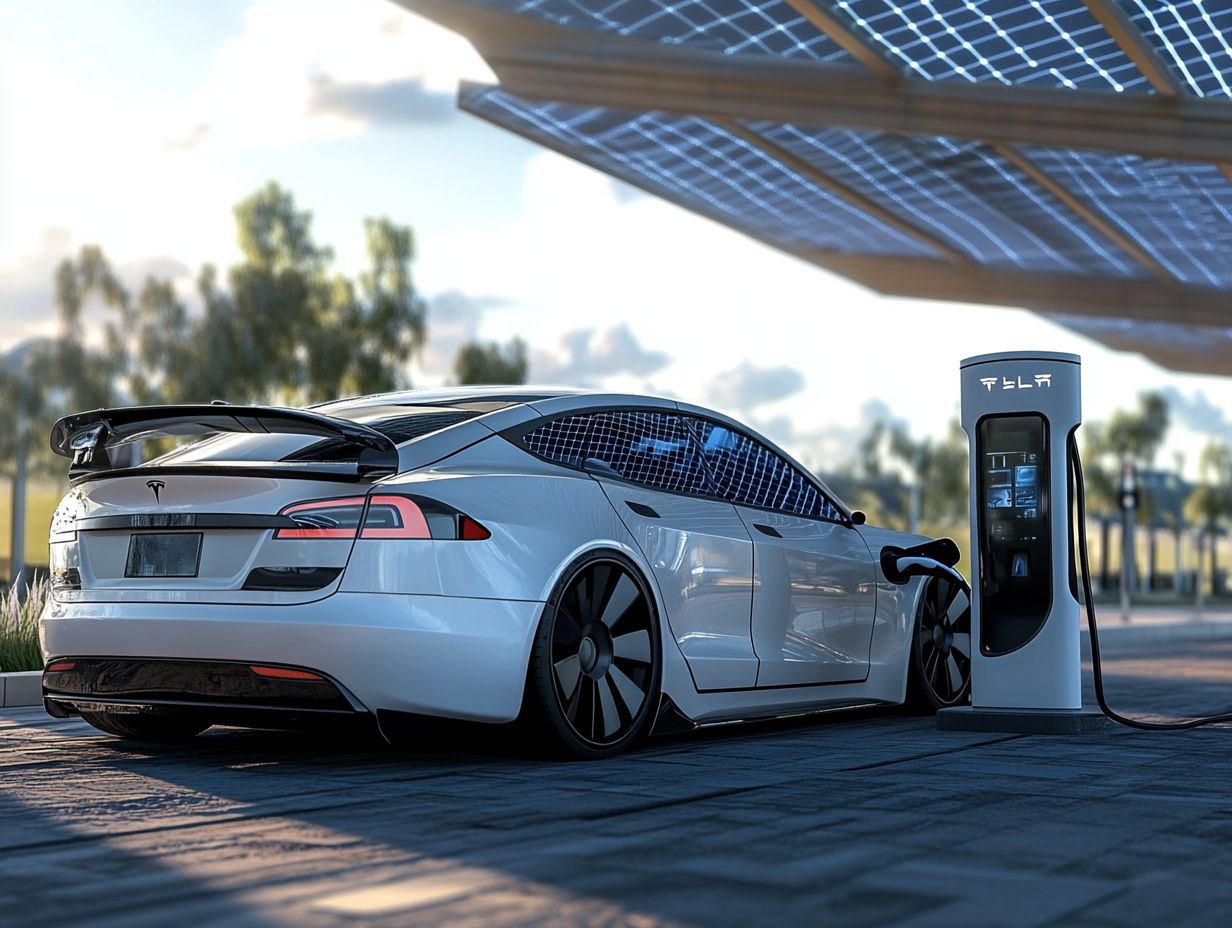
The swift evolution of electric vehicle technology presents you with a spectrum of EV technology trends.
These innovations also include remarkable advancements in semiconductor technology, specifically wide bandgap semiconductors, which are materials that improve energy efficiency in electronics, like silicon carbide and gallium nitride.
Substantial enhancements in battery systems and charging infrastructure play a crucial role in boosting EV performance and fostering consumer adoption.
Advancements in Battery Technology
Recent advancements in battery technology are essential for enhancing energy efficiency and extending the range of electric vehicles.
This ultimately propels growth in electric vehicle registrations and fosters user acceptance around the globe.
With innovations like solid-state batteries and lithium-silicon composites, manufacturers achieve remarkable energy densities, allowing for longer drives on a single charge.
Breakthroughs in fast-charging technology are slashing charging times, making electric vehicles a more convenient choice for daily use.
Combined with improved longevity features that ensure batteries retain their capacity over time, these enhancements make electric vehicles more appealing to you.
As market adoption surges, it’s clear that superior battery performance is a pivotal factor driving the shift toward sustainable transportation.
Improvements in Charging Infrastructure
Improvements in charging infrastructure are crucial for embracing the widespread adoption of electric vehicles.
The focus is on developing robust public charging systems, fast chargers, and a comprehensive ecosystem that includes vehicle-to-home and vehicle-to-grid technologies.
This evolution in infrastructure is crucial for making your driving experience easier and more convenient!
Public charging stations, strategically positioned in urban centers and along major highways, are becoming more accessible, allowing you to fuel your vehicle quickly and efficiently.
The integration of fast chargers is key to this transformation, slashing charging times from hours to mere minutes.
As technological advancements continue to unfold, the vision for a seamless charging experience encompasses not just public access but also home charging solutions.
This will encourage you and many others to transition to electric vehicles, ultimately paving the way for a greener future.
Get ready to embrace the future of driving with electric vehicles!
Integration of Artificial Intelligence
The integration of artificial intelligence in electric vehicle technology is revolutionizing vehicle performance. It delivers enhanced functionalities like smart maintenance that helps catch problems early, smart navigation, and advanced driver-assistance systems.
This shift meets your growing expectations for smart mobility solutions. These innovations maximize efficiency and elevate safety, catering to your tech-savvy lifestyle.
With real-time data analytics, your vehicle can optimize energy consumption based on driving patterns and environmental conditions. This significantly enhances both range and sustainability.
AI-powered systems learn from your behavior, providing personalized features that adapt to your preferences from climate control to infotainment options. As manufacturers work to meet these elevated expectations, the role of artificial intelligence in enriching your overall driving experience becomes increasingly crucial.
This results in more intuitive, responsive, and enjoyable journeys for you and everyone involved.
Impact of Electric Vehicles on the Environment
Electric vehicles are your chance to make a real difference! They significantly reduce carbon emissions and lessen dependence on fossil fuels, contributing to sustainable mobility.
This shift is crucial in the fight against climate change and in promoting cleaner transportation solutions for a better future.
Reducing Carbon Emissions
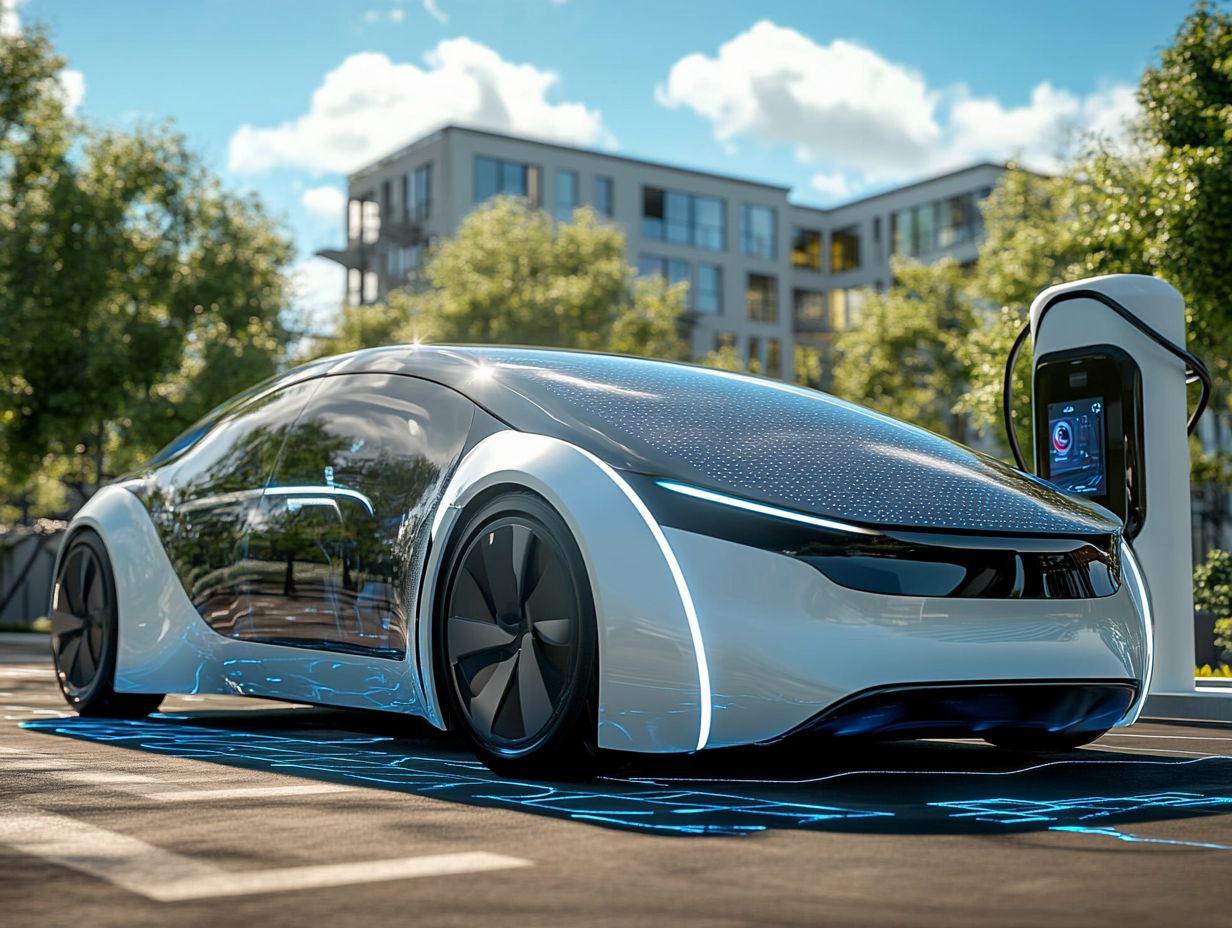
One of the standout advantages of electric vehicles is their remarkable ability to reduce carbon emissions. This contributes to cleaner air and cultivates a healthier environment.
Electric vehicles achieve this by harnessing electricity stored in batteries rather than relying on gasoline or diesel, which are significant sources of greenhouse gases.
The shift from fossil fuels to renewable energy sources like solar, wind, or hydropower enhances their positive impact on emissions.
Unlike traditional vehicles that release pollutants during operation, electric models operate with zero tailpipe emissions. Even when you factor in electricity generation, studies consistently show that electric vehicles typically produce lower overall emissions compared to internal combustion engine counterparts.
This underscores their crucial role in combating climate change and promoting cleaner transportation solutions for all.
Reducing Dependence on Fossil Fuels
By embracing alternative energy sources, electric vehicles play a pivotal role in reducing your dependence on fossil fuels. This fosters a transition toward sustainable mobility and promotes energy diversification.
This shift enhances your energy security and supports vital climate initiatives by decreasing greenhouse gas emissions.
With the integration of renewable energy sources like solar, wind, and hydroelectric power, charging your electric vehicle can significantly lessen reliance on traditional energy grids.
The collaboration between electric vehicles and renewable energy paves the way for the development of smart grids. This enables superior energy management and distribution.
As more consumers choose electric mobility, this trend catalyzes investment in clean technologies and infrastructure, creating a cleaner, more resilient future that benefits both the environment and society.
The Promising Future of Electric Vehicles: What to Expect
The future of electric vehicles is on the brink of remarkable expansion. You can expect a dramatic increase in electric truck sales, accompanied by groundbreaking innovations that will reshape the automotive landscape.
This evolution aligns with global trends toward electrification and emphasizes a commitment to sustainability that is becoming increasingly vital in today’s market.
Act now to embrace electric vehicles and help save our planet!
Predictions and Possibilities
Future predictions for electric vehicles suggest you re about to witness a seismic shift in the automotive market. This transformation is fueled by government incentives and your growing demand for sustainability.
Continuous technological innovations are elevating vehicle capabilities. As automakers adapt to your eco-conscious expectations, experts predict that electric vehicles will comprise a significant share of total vehicle sales in the next decade.
This shift is further supported by anticipated technological advancements think improved battery efficiency and an expanding charging infrastructure that will ease any lingering range anxiety you might have. With governments around the globe boosting incentives, like tax credits and rebates, the market is primed for a transformative leap you won t want to miss!
Experts emphasize your changing preferences for cleaner transportation options, signaling that the future of electric vehicles is not only promising but essential for a sustainable world.
Watch the video above to learn more about electric vehicle innovations!
Frequently Asked Questions
What are some of the latest trends in electric vehicle technology?
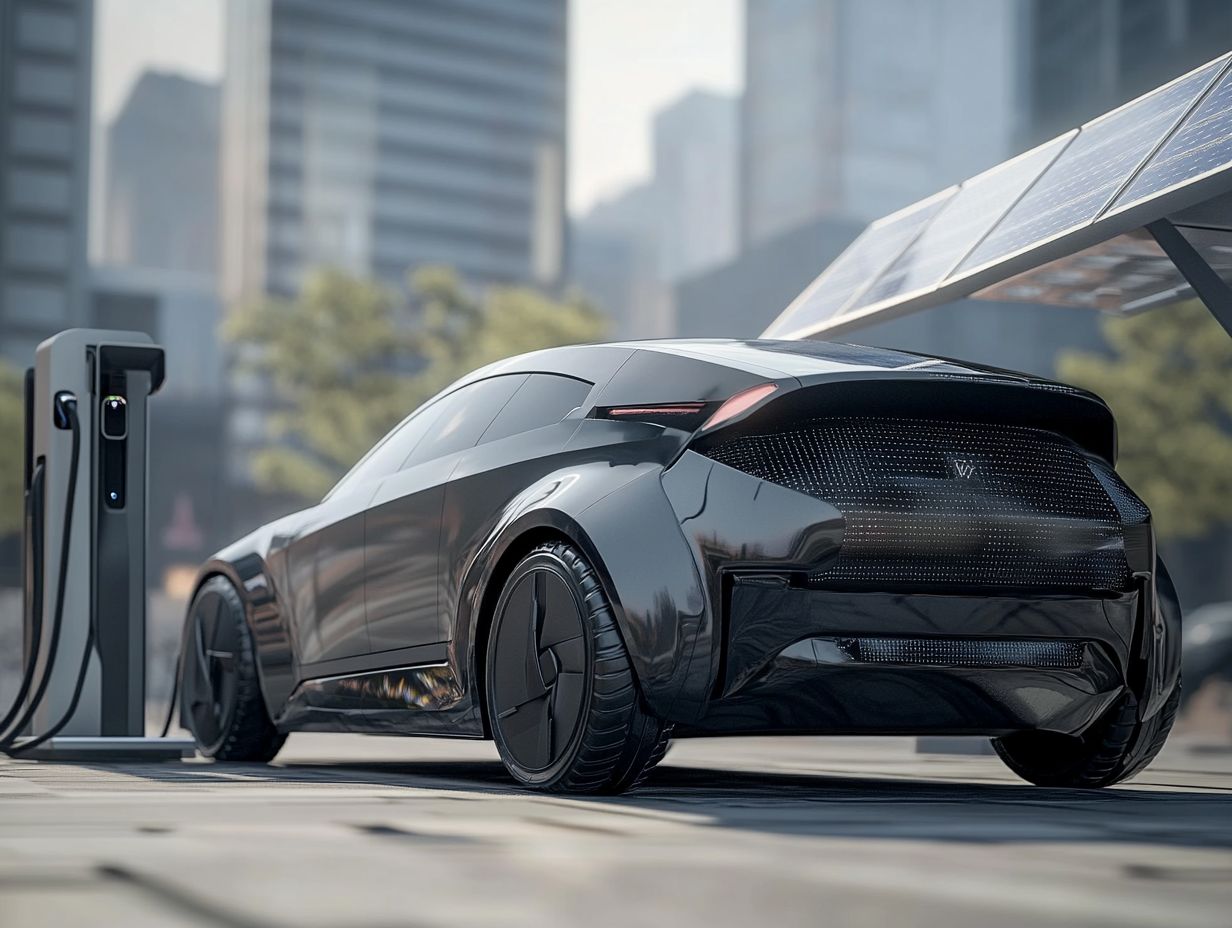
Some of the latest trends in electric vehicle technology include the development of longer-lasting batteries, the incorporation of artificial intelligence for self-driving capabilities, and what to expect in electric vehicle design trends that utilize renewable energy sources to power the vehicles.
How are electric vehicles evolving in terms of battery technology?
Electric vehicles are rapidly evolving, focusing on developing longer-lasting batteries that can hold more charge and be charged faster. This will greatly increase the range of electric vehicles and make them more convenient for everyday use.
What role does artificial intelligence play in electric vehicle technology?
Artificial intelligence is playing a major role in electric vehicle technology, significantly improving the safety and efficiency of these vehicles. AI is used for self-driving capabilities, predictive maintenance, and optimizing energy consumption.
How are electric vehicles utilizing renewable energy sources?
Many electric vehicles are incorporating renewable energy sources such as solar panels and systems that recover energy while slowing down to power the vehicle and recharge the battery. This helps reduce reliance on traditional energy sources and makes electric vehicles more sustainable.
What are some of the benefits of the latest electric vehicle technology?
The latest electric vehicle technology offers various benefits, such as reduced carbon emissions, lower operating costs, and improved performance. These vehicles also have the potential to revolutionize transportation and reduce our dependence on fossil fuels.
Are there any challenges facing the adoption of electric vehicle technology?
While electric vehicle technology is constantly evolving, some challenges need addressing for widespread adoption. These include high upfront costs, limited charging infrastructure, and concerns about battery life and range. Efforts are being made to overcome these obstacles and continue advancing electric vehicle technology.

